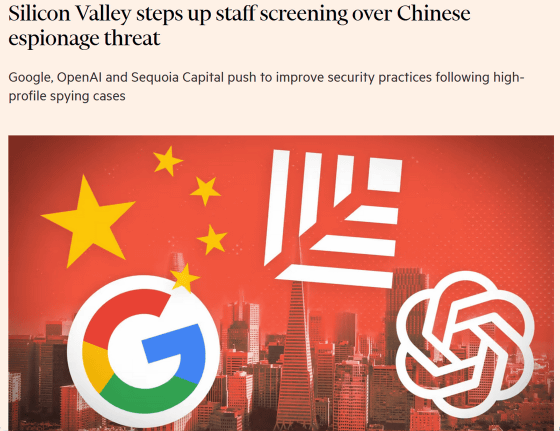Tech companies like Google and OpenAI are stepping up scrutiny of employees and job candidates to see if they are 'Chinese spies'

As geopolitical tensions between the United States and China rise, there have been frequent
Silicon Valley steps up staff screening over Chinese espionage threat
https://www.ft.com/content/c5594136-55f7-43c3-8914-d1c4290f6670

Tech Firms Tighten Staff Scrutiny Over China Spying Concerns
https://www.pymnts.com/technology/2024/tech-firms-tighten-staff-scrutiny-over-china-spying-concerns/
Citing multiple sources, the Financial Times reported that tech giants such as Google and high-profile startups such as OpenAI are stepping up their talent screening, amid growing concerns that 'foreign governments are seeking to use internal workers to gain access to intellectual property and corporate data.'
Sequoia Capital, a venture capital firm that has invested in many technology companies, is also encouraging its portfolio companies to step up security screening of their staff after receiving warnings that foreign intelligence agencies are targeting American tech workers. Sequoia Capital has also taken steps to separate its China business in 2023 in preparation for an escalating conflict between the United States and China.
In response to a request from the Financial Times, Google said, 'We have rigorous safeguards in place to prevent the theft of commercially sensitive information and trade secrets.' Sequoia Capital declined to comment, and OpenAI did not respond to a request for comment.

Alex Karp, CEO of
And Herbert McMaster , a former national security adviser who has advised tech and investment companies on the risks of espionage, argues that the threat from Chinese intelligence is real. 'The companies that I talk to and work with understand this very well and are doing everything they can to reduce the risks,' McMaster said.
Some private companies have already begun providing companies with strategic intelligence on Chinese espionage. Utah-based Strider Technologies uses AI to collect data on how foreign intelligence agencies target companies and their employees, then flags employees or potential employees for potential red flags. If a flag is raised, the company can then conduct additional screening, such as checking the individual's family or financial ties abroad, or travel history.
According to Strider Technologies CEO Greg Levesque, Strider's systems are increasingly being adopted by startups working on emerging technologies such as quantum computing, AI, and synthetic biology. These technologies are key targets for countries like China, but Levesque commented, 'We're seeing this movement across the Fortune 500. Everyone's a target. Industry is becoming the front line of the geopolitical battle.'

The conflict between the United States and China is becoming increasingly intense, and in April 2024, a bill was passed requiring TikTok's parent company, ByteDance, to sell TikTok. TikTok is challenging the bill on the basis of the First Amendment to the United States Constitution, which guarantees freedom of expression and speech.
At the same time, the Financial Times pointed out concerns that the move could lead to increased xenophobia among US tech companies.
Related Posts:
in Note, Posted by log1h_ik







